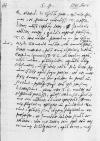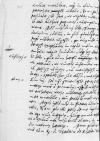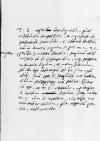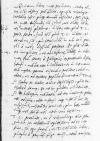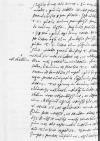Tuae Celsitudinis cf. [Ioannes DANTISCUS] to Georg WITZEL (VICELIUS) Heilsberg (Lidzbark Warmiński), 1541-09-24, CIDTC IDL 2490⌊litterascf. [Ioannes DANTISCUS] to Georg WITZEL (VICELIUS) Heilsberg (Lidzbark Warmiński), 1541-09-24, CIDTC IDL 2490⌋ mense Septembri datas Fe Ianuario redditas accepi gaudio repente perfusus Tuam Celsitudinem bene valere. Perrarum enim hoc ipsum est nunc on the margin⌈nuncnunc on the margin⌉ in Germany (Germania, Niemcy)⌊GermaniaGermany (Germania, Niemcy)⌋ nostra, ubi omnia passim superinscribed⌈passimpassim superinscribed⌉ pestilitate maerent, post anni superioris inediam. Ceterum ignoravisse Tuam Celsitudinem, ubi locorum agerem, nihil miror, quandoquidem regnantibus ubique schismaticis nusquam certis sedibus frui licet. Ago nunc Fulda, city in central Germany, Hesse, 100 km NE of Frankfurt am Main⌊FuldaeFulda, city in central Germany, Hesse, 100 km NE of Frankfurt am Main⌋ apud fagos patrios, sed res meae fixis ancoris ne hic quidem in portum consistunt, posteaquam fagi etiam ipsi sensim luterascunt, miror vero Tuam Celsitudinem moveri ad suspicionem potuisse, quasi verum sit, quod de me viri mendaces rumore sparserant. Enormius flagitium effingere non quiverunt. Norunt, quantus sim, id genus flagitiorum repraehensor innocentiae laudator simul ac sectator. Ideo me Satan tam foedi, tam atri criminis divulgatione, apud bonos, mei
 UUB, H. 154, f. 55v
amantes maculare atque in odium mei pertrahere sataget nititur. Eo enim pacto persuadet sibi fore, ut vigilias meas, utpote tali auctore prognatas, contemptim abiiciant. Est mihi domi liber, Farrago mendaciorum dictus, in quem quadringenta prope mendacia congessi qu, cuiusmodi impudentissimos sycophantas in caput meum turpiter ementiri coegit invidia, idque hoc decennali bello, quo cum haeresi confligo conflixi. Nihil non attentant, ut Vuicelii infament novis iam falsissimis conviciis, iam manifestissimis mendaciis sperantes vel superinscribed⌈velvel superinscribed⌉ hoc suo ausu me superatum iri, sed, nisi scirem eum on the margin⌈eumeum on the margin⌉ esse gentis schismaticae morem a primordiis usque ecclesiae ut orthodoxos variis mendaciorum generibus opprimere conarentur, tam facile id mali vix ferrem. Atqui istud mihi in pietatis lucrum cedit, nam quo illi peius de me loqu<u>ntur, eo ego vivo integrius hucque omnia refero, ut conscientiam meam mihi bonam tuear, in medio nationis haereticae. Porro quod Tua Celsitudo una cum r(everendo) domino Dietrich von Rheden (Teodoryk Reden) (*1492 – †1556), doctor of both canon and civil law. Rheden spent most of his life in Rome where he was dealing with, among other things, the affairs of the Ermland Chapter; 1532-1551 Canon of Ermland (Warmia); Canon of Mainz and Lübeck; in 1551 he was appointed Bishop of Lübeck, but he did not accept the dignity (KOPICZKO 2, p. 263; SBKW, p. 200)⌊Theoderico de RhedenDietrich von Rheden (Teodoryk Reden) (*1492 – †1556), doctor of both canon and civil law. Rheden spent most of his life in Rome where he was dealing with, among other things, the affairs of the Ermland Chapter; 1532-1551 Canon of Ermland (Warmia); Canon of Mainz and Lübeck; in 1551 he was appointed Bishop of Lübeck, but he did not accept the dignity (KOPICZKO 2, p. 263; SBKW, p. 200)⌋ Var
UUB, H. 154, f. 55v
amantes maculare atque in odium mei pertrahere sataget nititur. Eo enim pacto persuadet sibi fore, ut vigilias meas, utpote tali auctore prognatas, contemptim abiiciant. Est mihi domi liber, Farrago mendaciorum dictus, in quem quadringenta prope mendacia congessi qu, cuiusmodi impudentissimos sycophantas in caput meum turpiter ementiri coegit invidia, idque hoc decennali bello, quo cum haeresi confligo conflixi. Nihil non attentant, ut Vuicelii infament novis iam falsissimis conviciis, iam manifestissimis mendaciis sperantes vel superinscribed⌈velvel superinscribed⌉ hoc suo ausu me superatum iri, sed, nisi scirem eum on the margin⌈eumeum on the margin⌉ esse gentis schismaticae morem a primordiis usque ecclesiae ut orthodoxos variis mendaciorum generibus opprimere conarentur, tam facile id mali vix ferrem. Atqui istud mihi in pietatis lucrum cedit, nam quo illi peius de me loqu<u>ntur, eo ego vivo integrius hucque omnia refero, ut conscientiam meam mihi bonam tuear, in medio nationis haereticae. Porro quod Tua Celsitudo una cum r(everendo) domino Dietrich von Rheden (Teodoryk Reden) (*1492 – †1556), doctor of both canon and civil law. Rheden spent most of his life in Rome where he was dealing with, among other things, the affairs of the Ermland Chapter; 1532-1551 Canon of Ermland (Warmia); Canon of Mainz and Lübeck; in 1551 he was appointed Bishop of Lübeck, but he did not accept the dignity (KOPICZKO 2, p. 263; SBKW, p. 200)⌊Theoderico de RhedenDietrich von Rheden (Teodoryk Reden) (*1492 – †1556), doctor of both canon and civil law. Rheden spent most of his life in Rome where he was dealing with, among other things, the affairs of the Ermland Chapter; 1532-1551 Canon of Ermland (Warmia); Canon of Mainz and Lübeck; in 1551 he was appointed Bishop of Lübeck, but he did not accept the dignity (KOPICZKO 2, p. 263; SBKW, p. 200)⌋ Var UUB, H. 154, f. 57rmiensi cano(nico) libros meae parvitatis recens editos sibi adferri postulat, agnosco theologiae Catholicae istic quoque amorem residere, etsi scripta mea eiusmodi non sunt, ut tantos lectores sibi de on the margin⌈sibi desibi de on the margin⌉mereri queant. Libens vero, quod Tua Celsitudo petit, fecero, immo est, quod Tua Celsitudo iubeat, si tantum sit, qui sarcinulam in oram tam procul a nobis dissitam perferat. Et quae ista est iniquitas, ut adversariorum in nos on the margin⌈in nosin nos on the margin⌉ libelli in ultimas etiam terras a bibliopolis exportentur distrahendi, nostrae vero lucubrationes in Germany (Germania, Niemcy)⌊GermaniaGermany (Germania, Niemcy)⌋ etiam nostra perraro visantur prostare, tantum abest, ut ad exteros populos dimanent? Tametsi The Italians ⌊ItalosThe Italians ⌋ et The French ⌊GallosThe French ⌋ aiunt degustasse, quae orthodoxe damus et ne hoc quidem usu veniret, si bibliopolis nostratibus ad eas nationes pateret aditus. Adeo infensi atque infesti hostes mihi sunt miserandi homines, quin horum nullum umquam vel facto vel verbo uno laeserim.
UUB, H. 154, f. 57rmiensi cano(nico) libros meae parvitatis recens editos sibi adferri postulat, agnosco theologiae Catholicae istic quoque amorem residere, etsi scripta mea eiusmodi non sunt, ut tantos lectores sibi de on the margin⌈sibi desibi de on the margin⌉mereri queant. Libens vero, quod Tua Celsitudo petit, fecero, immo est, quod Tua Celsitudo iubeat, si tantum sit, qui sarcinulam in oram tam procul a nobis dissitam perferat. Et quae ista est iniquitas, ut adversariorum in nos on the margin⌈in nosin nos on the margin⌉ libelli in ultimas etiam terras a bibliopolis exportentur distrahendi, nostrae vero lucubrationes in Germany (Germania, Niemcy)⌊GermaniaGermany (Germania, Niemcy)⌋ etiam nostra perraro visantur prostare, tantum abest, ut ad exteros populos dimanent? Tametsi The Italians ⌊ItalosThe Italians ⌋ et The French ⌊GallosThe French ⌋ aiunt degustasse, quae orthodoxe damus et ne hoc quidem usu veniret, si bibliopolis nostratibus ad eas nationes pateret aditus. Adeo infensi atque infesti hostes mihi sunt miserandi homines, quin horum nullum umquam vel facto vel verbo uno laeserim.
Tua Celsitudo procuret, ut e Würzburg⌊VuirciburgoWürzburg⌋ aut Mayence (Mainz, Moguntia), city in western Germany, seat of the Prince-Elector Archbishops of Mayence, primates of Germany⌊MoguntiaMayence (Mainz, Moguntia), city in western Germany, seat of the Prince-Elector Archbishops of Mayence, primates of Germany⌋ per tabellionem equestrem ad se iter fiat, ibi ego faciam, ut Tua Celsitudo libros, quotquot a Misnensi fuga emisi, certo accipiat  UUB, H. 154, f. 57v singulos, binos aut trinos. Si unos tantum malit, quivis tabellio itinere pedestri ferendis hisce par fuerit. Ipse ad libitum Tuae Celsitudini quaevis animo promptissimo faciam, modo norim iussa. Mayence (Mainz, Moguntia), city in western Germany, seat of the Prince-Elector Archbishops of Mayence, primates of Germany⌊MogunciaeMayence (Mainz, Moguntia), city in western Germany, seat of the Prince-Elector Archbishops of Mayence, primates of Germany⌋ prostant omnes hidden by binding⌈[s]s hidden by binding⌉, ii etiam, quibus ego domi careo. Ea de re per litteras agam cum Ambrosio Prusso, per quem Tuae Celsitudinis litterae cum subsidio redditae sunt. Habeo gratiam beneficae tuae pietatis hidden by binding⌈[is]is hidden by binding⌉. Utinam sic mea se haberet res, ut nullius sacellion mei gratia vel tantillum on the margin⌈vel tantillumvel tantillum on the margin⌉ imminueretur. Ante, ni fallor, biennium ex marchia Tuam Celsitudinem reddidi certiorem de domestico sumptu, quem hic quoque cogor facere coniugatulus quantumvis parce victitans. Tot opimos in annum reditus concubinariis nostratibus neutiquam invideo. Scandalo hidden by binding⌈[o]o hidden by binding⌉ tantum uror vehementissime ac deploro me[...] hidden by binding⌈[...][...] hidden by binding⌉ cum religionem Jesus of Nazareth (Jesus Christ), in Christianity the Messiah foretold in the Old Testament⌊ChristiJesus of Nazareth (Jesus Christ), in Christianity the Messiah foretold in the Old Testament⌋ venisse huc, ut sceleri venia sit et opulentia crimen alatur. Quam foret necesse, ut tandem allatis remediis ecclesiae nostrae morbi sanarentur. Cetero, quin nos aut reformabit intestina seditio, aut Turchica expeditio. Speyer (Spira), city in western Germany, on the Rhine river, 25 km S of Mannheim⌊NemetiSpeyer (Spira), city in western Germany, on the Rhine river, 25 km S of Mannheim⌋ nunc Holy Roman Empire of the German Nation (Empire, Reich, Imperium)⌊imperiiHoly Roman Empire of the German Nation (Empire, Reich, Imperium)⌋ proceres confluunt consultaturi de
UUB, H. 154, f. 57v singulos, binos aut trinos. Si unos tantum malit, quivis tabellio itinere pedestri ferendis hisce par fuerit. Ipse ad libitum Tuae Celsitudini quaevis animo promptissimo faciam, modo norim iussa. Mayence (Mainz, Moguntia), city in western Germany, seat of the Prince-Elector Archbishops of Mayence, primates of Germany⌊MogunciaeMayence (Mainz, Moguntia), city in western Germany, seat of the Prince-Elector Archbishops of Mayence, primates of Germany⌋ prostant omnes hidden by binding⌈[s]s hidden by binding⌉, ii etiam, quibus ego domi careo. Ea de re per litteras agam cum Ambrosio Prusso, per quem Tuae Celsitudinis litterae cum subsidio redditae sunt. Habeo gratiam beneficae tuae pietatis hidden by binding⌈[is]is hidden by binding⌉. Utinam sic mea se haberet res, ut nullius sacellion mei gratia vel tantillum on the margin⌈vel tantillumvel tantillum on the margin⌉ imminueretur. Ante, ni fallor, biennium ex marchia Tuam Celsitudinem reddidi certiorem de domestico sumptu, quem hic quoque cogor facere coniugatulus quantumvis parce victitans. Tot opimos in annum reditus concubinariis nostratibus neutiquam invideo. Scandalo hidden by binding⌈[o]o hidden by binding⌉ tantum uror vehementissime ac deploro me[...] hidden by binding⌈[...][...] hidden by binding⌉ cum religionem Jesus of Nazareth (Jesus Christ), in Christianity the Messiah foretold in the Old Testament⌊ChristiJesus of Nazareth (Jesus Christ), in Christianity the Messiah foretold in the Old Testament⌋ venisse huc, ut sceleri venia sit et opulentia crimen alatur. Quam foret necesse, ut tandem allatis remediis ecclesiae nostrae morbi sanarentur. Cetero, quin nos aut reformabit intestina seditio, aut Turchica expeditio. Speyer (Spira), city in western Germany, on the Rhine river, 25 km S of Mannheim⌊NemetiSpeyer (Spira), city in western Germany, on the Rhine river, 25 km S of Mannheim⌋ nunc Holy Roman Empire of the German Nation (Empire, Reich, Imperium)⌊imperiiHoly Roman Empire of the German Nation (Empire, Reich, Imperium)⌋ proceres confluunt consultaturi de  UUB, H.155, f. 58r bello The Ottoman Turks (Turcae) ⌊Mahometicis beluisThe Ottoman Turks (Turcae) ⌋ inferendo. Verum dum nostri inter sese on the margin⌈inter seseinter sese on the margin⌉ consilium capiunt, istae The Ottoman Turks (Turcae) ⌊feraeThe Ottoman Turks (Turcae) ⌋ vicinos agros depopulari pergunt. Austria⌊AustriaAustria⌋ prima erit victima vere novo, nisi poenitentes nos et protegat Dominus et precantes adiuvet Germanica panoplia. De salute Poland (Kingdom of Poland, Polonia)⌊PoloniaePoland (Kingdom of Poland, Polonia)⌋ ac Sarmatiae ipsi videritis. Nos certe The Germans ⌊AlemaniThe Germans ⌋, ab inferis resuscitatos The Goths ⌊GothosThe Goths ⌋ misere metuimus, utpote mutuae inter nos on the margin⌈mutuae inter nosmutuae inter nos on the margin⌉ discordiae conscii. Profecto concordes nec Suleiman the Magnificent (*1494 – †1566), 1520-1566 Sultan of the Ottoman Empire⌊TurcamSuleiman the Magnificent (*1494 – †1566), 1520-1566 Sultan of the Ottoman Empire⌋ nec Chamum formidaremus, tam dextre bellax est haec natio. Dominus Jesus of Nazareth (Jesus Christ), in Christianity the Messiah foretold in the Old Testament⌊IesusJesus of Nazareth (Jesus Christ), in Christianity the Messiah foretold in the Old Testament⌋ in navi evigilet et comprimat periculosissimos motus, nisi enim ipse custodierit ecclesiam, in vanum laborant custodes principes. Male timeo huic inemendatae, reformatam, quo debet, modo ne inferorum quidem portae laedent.
UUB, H.155, f. 58r bello The Ottoman Turks (Turcae) ⌊Mahometicis beluisThe Ottoman Turks (Turcae) ⌋ inferendo. Verum dum nostri inter sese on the margin⌈inter seseinter sese on the margin⌉ consilium capiunt, istae The Ottoman Turks (Turcae) ⌊feraeThe Ottoman Turks (Turcae) ⌋ vicinos agros depopulari pergunt. Austria⌊AustriaAustria⌋ prima erit victima vere novo, nisi poenitentes nos et protegat Dominus et precantes adiuvet Germanica panoplia. De salute Poland (Kingdom of Poland, Polonia)⌊PoloniaePoland (Kingdom of Poland, Polonia)⌋ ac Sarmatiae ipsi videritis. Nos certe The Germans ⌊AlemaniThe Germans ⌋, ab inferis resuscitatos The Goths ⌊GothosThe Goths ⌋ misere metuimus, utpote mutuae inter nos on the margin⌈mutuae inter nosmutuae inter nos on the margin⌉ discordiae conscii. Profecto concordes nec Suleiman the Magnificent (*1494 – †1566), 1520-1566 Sultan of the Ottoman Empire⌊TurcamSuleiman the Magnificent (*1494 – †1566), 1520-1566 Sultan of the Ottoman Empire⌋ nec Chamum formidaremus, tam dextre bellax est haec natio. Dominus Jesus of Nazareth (Jesus Christ), in Christianity the Messiah foretold in the Old Testament⌊IesusJesus of Nazareth (Jesus Christ), in Christianity the Messiah foretold in the Old Testament⌋ in navi evigilet et comprimat periculosissimos motus, nisi enim ipse custodierit ecclesiam, in vanum laborant custodes principes. Male timeo huic inemendatae, reformatam, quo debet, modo ne inferorum quidem portae laedent.
Tua Celsitudo in Jesus of Nazareth (Jesus Christ), in Christianity the Messiah foretold in the Old Testament⌊ChristoJesus of Nazareth (Jesus Christ), in Christianity the Messiah foretold in the Old Testament⌋ Servatore Panomphaeo bene superstes diu vivat recteque valeat utroque homine.
 UUB, H. 154, f. 55v
amantes maculare atque in odium mei pertrahere sataget nititur. Eo enim pacto persuadet sibi fore, ut vigilias meas, utpote tali auctore prognatas, contemptim abiiciant. Est mihi domi liber, Farrago mendaciorum dictus, in quem quadringenta prope mendacia congessi qu, cuiusmodi impudentissimos sycophantas in caput meum turpiter ementiri coegit invidia, idque hoc decennali bello, quo cum haeresi confligo conflixi. Nihil non attentant, ut Vuicelii infament novis iam falsissimis conviciis, iam manifestissimis mendaciis sperantes vel superinscribed⌈velvel superinscribed⌉ hoc suo ausu me superatum iri, sed, nisi scirem eum on the margin⌈eumeum on the margin⌉ esse gentis schismaticae morem a primordiis usque ecclesiae ut orthodoxos variis mendaciorum generibus opprimere conarentur, tam facile id mali vix ferrem. Atqui istud mihi in pietatis lucrum cedit, nam quo illi peius de me loqu<u>ntur, eo ego vivo integrius hucque omnia refero, ut conscientiam meam mihi bonam tuear, in medio nationis haereticae. Porro quod Tua Celsitudo una cum r(everendo) domino
UUB, H. 154, f. 55v
amantes maculare atque in odium mei pertrahere sataget nititur. Eo enim pacto persuadet sibi fore, ut vigilias meas, utpote tali auctore prognatas, contemptim abiiciant. Est mihi domi liber, Farrago mendaciorum dictus, in quem quadringenta prope mendacia congessi qu, cuiusmodi impudentissimos sycophantas in caput meum turpiter ementiri coegit invidia, idque hoc decennali bello, quo cum haeresi confligo conflixi. Nihil non attentant, ut Vuicelii infament novis iam falsissimis conviciis, iam manifestissimis mendaciis sperantes vel superinscribed⌈velvel superinscribed⌉ hoc suo ausu me superatum iri, sed, nisi scirem eum on the margin⌈eumeum on the margin⌉ esse gentis schismaticae morem a primordiis usque ecclesiae ut orthodoxos variis mendaciorum generibus opprimere conarentur, tam facile id mali vix ferrem. Atqui istud mihi in pietatis lucrum cedit, nam quo illi peius de me loqu<u>ntur, eo ego vivo integrius hucque omnia refero, ut conscientiam meam mihi bonam tuear, in medio nationis haereticae. Porro quod Tua Celsitudo una cum r(everendo) domino  UUB, H. 154, f. 57rmiensi cano(nico) libros meae parvitatis recens editos sibi adferri postulat, agnosco theologiae Catholicae istic quoque amorem residere, etsi scripta mea eiusmodi non sunt, ut tantos lectores sibi de on the margin⌈sibi desibi de on the margin⌉mereri queant. Libens vero, quod Tua Celsitudo petit, fecero, immo est, quod Tua Celsitudo iubeat, si tantum sit, qui sarcinulam in oram tam procul a nobis dissitam perferat. Et quae ista est iniquitas, ut adversariorum in nos on the margin⌈in nosin nos on the margin⌉ libelli in ultimas etiam terras a bibliopolis exportentur distrahendi, nostrae vero lucubrationes in
UUB, H. 154, f. 57rmiensi cano(nico) libros meae parvitatis recens editos sibi adferri postulat, agnosco theologiae Catholicae istic quoque amorem residere, etsi scripta mea eiusmodi non sunt, ut tantos lectores sibi de on the margin⌈sibi desibi de on the margin⌉mereri queant. Libens vero, quod Tua Celsitudo petit, fecero, immo est, quod Tua Celsitudo iubeat, si tantum sit, qui sarcinulam in oram tam procul a nobis dissitam perferat. Et quae ista est iniquitas, ut adversariorum in nos on the margin⌈in nosin nos on the margin⌉ libelli in ultimas etiam terras a bibliopolis exportentur distrahendi, nostrae vero lucubrationes in  UUB, H. 154, f. 57v singulos, binos aut trinos. Si unos tantum malit, quivis tabellio itinere pedestri ferendis hisce par fuerit. Ipse ad libitum Tuae Celsitudini quaevis animo promptissimo faciam, modo norim iussa.
UUB, H. 154, f. 57v singulos, binos aut trinos. Si unos tantum malit, quivis tabellio itinere pedestri ferendis hisce par fuerit. Ipse ad libitum Tuae Celsitudini quaevis animo promptissimo faciam, modo norim iussa.  UUB, H.155, f. 58r bello
UUB, H.155, f. 58r bello 